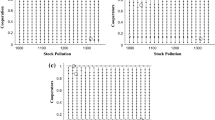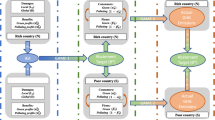Abstract
Some features of international environmental problems are considered. A basic problem is to induce countries to adopt a cooperative approach. One of the instruments to induce countries to cooperate is an exchange of concessions in fields of relative strengths, such as swapping trade concessions for cooperation on international environmental problems. This instrument will be modelled in this paper with tensor games. Both tradeoff and non-tradeoff tensor games will be addressed, with emphasis on tradeoff tensor games with linear strict weights. The relationship between the Pareto equilibria of a non-tradeoff tensor game and the Nash equilibria of the associated tradeoff tensor games will be studied. Due to structural similarities between tensor games and repeated multiple objective games, some attention will also be paid to the latter. Relationships between objects related to Folk theorems for the tradeoff tensor game with completely additive weights and the corresponding objects for its constituting isolated games will be studied. Since many international environmental problems have prisoners' dilemma characteristics, it is analyzed how interconnection may enhance cooperation in prisoners' dilemma games.
Similar content being viewed by others
References
D. Anderson and R. Blackhurst,The Greening of World Trade Issues (Harvester Wheatsheaf, Hampsted, 1992).
B. Bernheim and M. Whinston, Multimarket contact and collusive behavior, Rand J. Econ. 21(1990)1–26.
O. Blackwell, An analog of the minimax theorem for vector payoffs, Pacific J. Math. 6(1956)1–8.
H. Folmer and C. Howe, Environmental problems and policy in the single European market, Env. Resource Econ. 1(1991)17–42.
H. Folmer, P. v. Mouche and S. Ragland, Interconnected games and international environmental problems, Env. Resource Econ. 3(1993)313–335.
H. Folmer, Towards a sustainable economy: The need for international cooperation on the environment, in:The Environment: Towards a Sustainable Future, ed. Dutch Committee for Long Term Environmental Policy (Kluwer, Dordrecht, 1993) pp. 373–394.
J. Friedman,Game Theory with Applications to Economics (Oxford University Press, Oxford, 1991, 1986).
K. Mäler, The acid rain game, in:Valuation Methods and Policy Making in Environmental Economics, ed. H. Folmer and E. van Ierland (Elsevier, Amsterdam, 1989) pp. 231–252.
K. Mäler, International environmental problems, Oxford Rev. Econ. Policy 6(1990)80–108.
G. Tsebelis,Nested Games (University of California Press, Berkeley, 1990).
J. Whally, The interface between environmental and trade policies, Econ. J. 101(1991)180–189.
J. Zhao, The equilibria of a multiple objective game, Int. J. Game Theory 20(1991)171–182.
Author information
Authors and Affiliations
Rights and permissions
About this article
Cite this article
Folmer, H., v. Mouche, P. Interconnected games and international environmental problems, II. Ann Oper Res 54, 97–117 (1994). https://doi.org/10.1007/BF02031729
Issue Date:
DOI: https://doi.org/10.1007/BF02031729
Keywords
- Modelling
- interconnection
- side payments
- game theory
- environment
- transboundary pollution
- multiple objective games
- repeated games
- tensor games
- tradeoff
- Pareto equilibrium
- Nash equilibrium
- Folk theorem
- prisoners' dilemma




